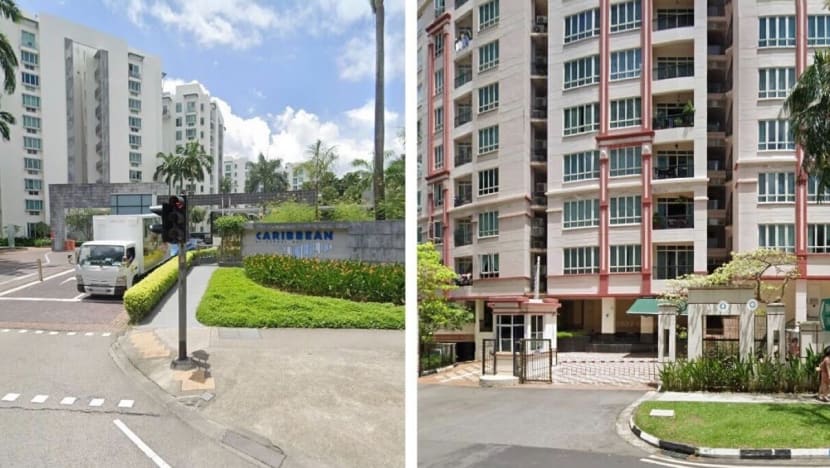Man fined S$1.16 million for subletting properties on Airbnb, HomeAway

The units were in properties such as Caribbean at Keppel Bay and Claremont in Killiney Road. (Images: Google Maps screengrabs)
SINGAPORE: A man was fined about S$1.16 million on Monday (May 30) for providing unauthorised short-term accommodation on platforms such as Airbnb and HomeAway.
Simon Chan Chai Wan, 57, leased 14 units and sublet them out for short-term accommodation. His girlfriend Zhao Jing, 43, was fined S$84,000 for aiding him.
The fine imposed on Chan is the largest amount given to a person in Singapore for such offences, the Urban Redevelopment Authority (URA) said.
He pleaded guilty to nine charges, while Zhao pleaded guilty to four charges. Under the Planning Act, first-time offenders can be fined up to S$200,000 per charge.
Chan and Zhao were both licensed real estate agents at the time, court documents showed. They were also the directors of two companies - HTM Solutions and HTM Management - for certain periods between 2016 and 2018. Chan was also the former director of a company called SNS Infotech Global.
Court documents showed that Chan leased various private residences to provide short-term accommodation to both local and foreign guests through the three companies, according to court documents.
The 14 units were in areas such as River Valley Road, Orchard Road, Killiney Road, Robinson Road and Keppel Bay. The properties include Claremont, Centrepoint Apartments, Caribbean at Keppel Bay and Robinson Suites.
The transactions took place on various platforms, including Airbnb and HomeAway, which allowed users to post listings for apartments or houses for short-term stays.
“(Chan) leased units for the purposes of subletting them out for short-term accommodation,” court documents said, adding that he also persuaded Zhao to enter into tenancy agreements with the owners of two of the units.
Throughout the tenancy period, Chan and Zhao did not inform the owners of the units that they were being sublet out for short-term accommodation. They knew that doing so was illegal, court documents showed.
Besides helping Chan rent two units as part of the scheme, Zhao also helped him to set up and manage host accounts on the Airbnb platform and to post listings for the units.
She registered the first host account on Airbnb in 2016 under the name “Jing” and listed several units. She also managed guest reservations, answered enquiries and updated the calendar.
"Without Zhao’s assistance, Chan would not have been able to carry out the STA operation. Chan took care of matters outside of the accounts, that is, the day-to-day running of the units," court documents said.
Investigations showed that Chan illegally provided short-term accommodation at 14 premises from Jun 30, 2017 to July 2018. The total revenue that he obtained was S$1,254,907.78.
Zhao was paid S$4,000 monthly for helping him in the scheme. Between Jun 30, 2017 and Aug 3, 2018, she received an income of about S$52,000.
Chan pleaded guilty to nine charges under the Planning Act, with another five taken into consideration for sentencing.
Under URA's regulations, all private residential properties rented out for accommodation purposes are subject to a minimum stay duration of three consecutive months.
"Property owners should also exercise due diligence to ensure that their properties are not used by their tenants for unauthorised purposes," said URA.
"Unauthorised short-term accommodation with frequent turnover of transient guests not only changes the residential character of a property, but also causes dis-amenities to neighbouring residents.
"URA will continue to take strong enforcement actions against short-term accommodation offenders, including property owners, tenants, agents and anyone found to have assisted in such illicit activities, in order to safeguard the interest of the community."
In response to CNA's queries, Ms Mich Goh, Airbnb's head of public policy for Southeast Asia, India, Hong Kong and Taiwan, said the company introduced a policy last year which requires hosts in Singapore to provide their licence numbers or confirm authorisations to continue hosting.
Listings that do not set a minimum required stay length of at least three months or are not updated with licence numbers or confirmation of relevant authorisations are no longer allowed to be listed on the platform in Singapore, said Ms Goh.
A "majority" of the listings complied with the new policy, said Ms Goh.
"Based on inventory analysis, we understand that of those that failed to do so and were removed, most were inactive or had not had more than two bookings during the 18 months prior to the policy update," she added.
“We continue to work collaboratively with the Singapore government to sustainably grow tourism in a way that benefits all Singaporeans and delivers positive outcomes for guests, hosts and the wider community," Ms Goh said.
A spokesperson from the Council for Estate Agencies (CEA) told CNA on Tuesday that Chan and Zhao are no longer registered property agents.
"Chan’s and Zhao’s registration expired at the end of 2019 and 2020 respectively, before they were convicted in court," said the spokesperson.
"Property agents are expected to comply with the relevant laws that apply to property transactions, including HDB and URA's regulations governing short-term accommodation (STA) at residences," the spokesperson added.
The spokesperson said that CEA takes a serious view of agents who flout government regulations.
"For former property agents with past convictions (such as committing STA-related offences) who wish to rejoin the real estate agency industry, CEA will take into account their prior offences and the rehabilitation period when assessing their re-applications."














